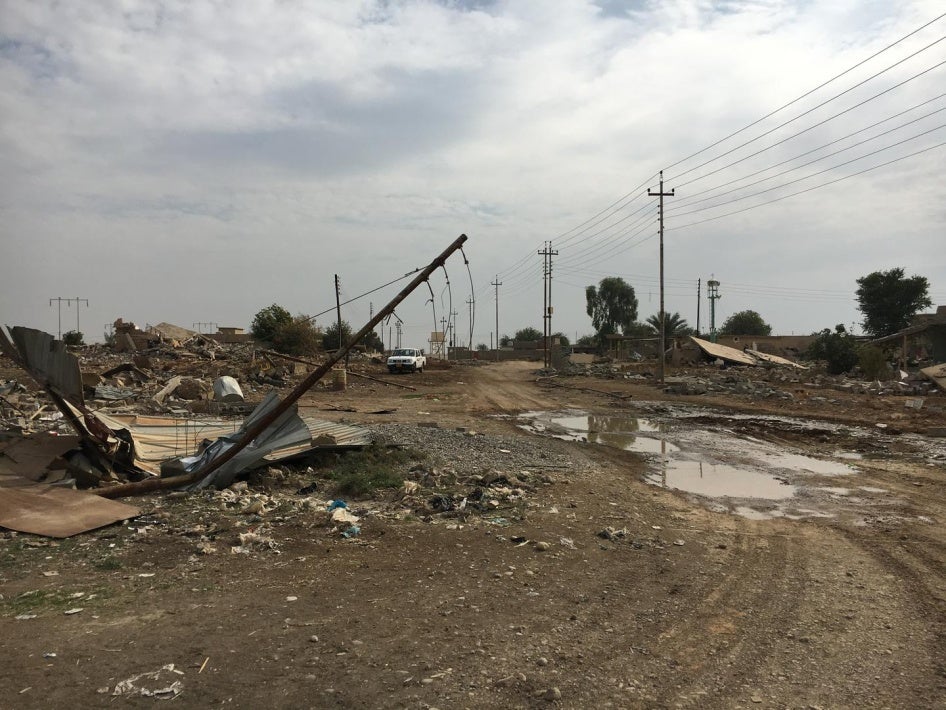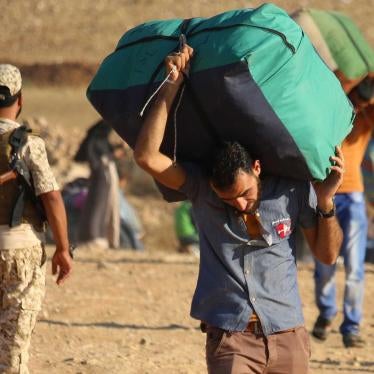The battle between Iraqi forces and the Islamic State in Iraq and Syria (ISIS) over the city of Mosul has already displaced over 35,000 civilians from inside the city and surrounding villages.
Many of those fleeing the city are Sunni Arabs, relieved to be free from ISIS, but deeply distressed. Over the last two weeks, dozens of families have told me they are concerned about what will happen to their homes while they are gone.
You would assume that they are concerned that the fighting might destroy their houses, but the fighting is only one of their worries.
In fact, in a previous round of the conflict, between the Peshmerga — the Kurdistan regional government's military, and ISIS in nearby provinces, Arab homes were destroyed largely after the fighting had moved on.
Our new research, based on visits to villages, interviews with witnesses and analysis of satellite imagery, documents a pattern of unlawful destruction of Arab homes and sometimes of entire Arab villages between September 2014 and May 2016 in areas of Kirkuk and Nineveh governorates as the Peshmerga took back control from ISIS.
In every case, we found no imperative military necessity that would warrant the destruction.
The Peshmerga are a key partner to the Iraqi forces in the battle to retake land from ISIS. Such destruction of civilian homes without justification amounts to a war crime. Kurdish forces have carried out this unlawful destruction even as the U.S. has, for the first time, started providing them with direct financial and military support for their fight against ISIS.
Washington should make clear to the Kurdish regional government that abusive military practices are not only problematic for ongoing security cooperation, but also for effective military operations. Although ISIS may be increasingly on the run, it is not in anyone's interest to create yet another marginalized generation with serious grievances and looking for revenge.
Recently, we visited two more villages in the Kirkuk area that Kurdish forces destroyed last month after ejecting all of the residents. The reason for these new demolitions? ISIS attacked Kirkuk on Oct. 21. Kurdish authorities told us they blame the Arab residents in and around the city for facilitating the attack, although another reason they gave for the demolitions was "illegal construction."
Within four days, KRG forces destroyed at least 100 homes and forcibly displaced at least 375 families, most from the June First neighborhood of southern Kirkuk, an all-Arab neighborhood.
At the same time, starting on Oct. 21, Kurdish forces carried out massive destruction in two other nearby villages, Qutan and Qoshkaya.
We visited Qutan on Nov. 8 to find virtually the entire village destroyed — approximately 90 out of 100 homes. Only the homes of 10 or 12 Turkmen families remained intact.
Several residents who were trying to retrieve some belongings from their destroyed homes told us that a dozen or so ISIS fighters had entered the village around 4 a.m. on Oct. 21 and took over the mosque loudspeaker to harangue the residents to join ISIS. The residents said they notified the nearby Peshmerga post. The Peshmerga arrived at 9 a.m., the ISIS fighters fled, and "it was quiet by 10 a.m.," as one resident put it.
Residents then said the Peshmerga told the Arab families to leave, detaining about 70 men for two days. Several residents said the Peshmerga brought in front-loader tractors ("shovels," the villagers called them) and began damaging homes that same day.
The next day, they said, they brought in a heavy bulldozer, which much more effectively destroyed the homes: flattening more than 10, heavily damaging another 50, and torching 20 or so more.
The residents said that when they asked why they were being punished in this way, they were told it was because they didn't fight ISIS hard enough.
The Peshmerga also forced residents of the nearby village of Qoshkaya to leave their homes on Oct. 21. We had visited Qoshkaya in May to document the destruction of some 30 homes a year earlier. When we visited again on Nov. 8, we found many more homes bulldozed or torched, as well as the primary school and medical clinic, and the village entirely deserted except for small groups of Kurds — in one case, in Peshmerga uniforms — who were clearly looting belongings, including undamaged windows and doorframes.
Any unjustified destruction of homes should end immediately; those responsible for any such acts in the past should be held accountable; those who suffered unlawful destruction of their homes should be compensated; and all displaced people, regardless of ethnicity or religion, should be allowed to return to their homes as quickly as possible.
The message the displaced Arabs receive with such apparent destruction and displacement is that they are no longer welcome in some of the areas that Kurdish forces now control.
Abusive policies carried out with impunity, this time targeting the Sunni Arab population, is a familiar one in Iraq's recent history and part of the reason we have ISIS today.










